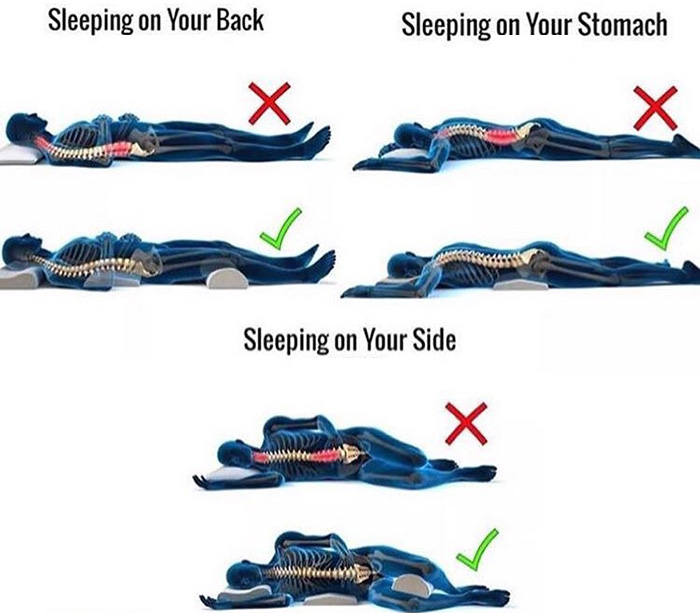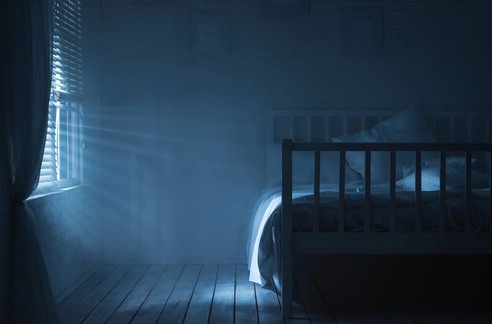How To Sleep With Back Pain
Back pain can be an arduous condition that may occupy your every waking moment. If you are attempting to manage such a situation, then you may very well be having difficulty finding resting moments as well. Sleep is a vital part of overall wellness and health. If back pain is affecting how you sleep, then you need to come to a solution as quickly as possible. Fortunately, there are measures you can take that may help you rest a little better, now.

Positioning
When you are trying to sleep, you are trying to balance both resting comfortably and assuming a posture that will prevent further pain and soreness. As such, what position you assume while asleep is highly essential.
Generally speaking, sleeping on your stomach is not advisable. The position naturally puts undue weight on your back and neck. However, if you gravitate toward this position or it helps with your particular condition, then you can provide support by placing a pillow under your lower abdomen to distribute the weight more evenly.
If you sleep on your side, you might want to consider placing a pillow between your knees. Without a pillow or similar support in that position, your spine and hips may hang and bend unnaturally throughout the night. Using some form of pad to space your legs out will promote better alignment of your body. Because sleeping on your side is inherently asymmetrical, take care not to favor one side night after night. Alternate to prevent uneven muscle development.
If you sleep on your back, try putting a pillow underneath your knees. This can help take the weight off of your lower back and have your spine extend more naturally while you sleep.
One common theme throughout all of these solutions is that they focus on the alignment of your spine and even weight distribution throughout your body. Even though we may not think of it often, keeping this sort of balance is crucial if you are maintaining a certain sleeping posture for perhaps eight hours a day. Though it can be difficult to monitor yourself, excessive tossing and turning can alter your posture and lead to pain during the day.

Environment
When trying to identify factors affecting your back pain while sleeping, it may be worth looking where and what you are sleeping on.
If possible, make your room as dark as possible. Light affects your biological clock and having unnecessary lights on can delay your sleep cycle, leading to more inefficient rest.
If your mattress is in shabby or worn out condition, it may be worth looking into an upgrade. A good mattress can be a considerable expense, but when you consider that you may spend about a third of your life on one, it merits some careful analysis. All mattresses are hardly crafted alike. They come in various degrees of firmness, length, and height. You might have to “test” multiple mattresses to determine what fits your needs. A bed that is too firm can cause your spine to bear weight unnaturally, causing pain in the lower back in particular. However, if your mattress is too soft and cushy, you might sink into the center with poor posture once your body settles. A mattress that is super thick may give the appearance of providing extra support. However, if you find yourself having to give a little leap each time you try and get on and absorbing impact in your ankles each time you get out of bed, that can add up over time. Like most things, it comes down to what is just right for your situation.

Conditioning
If you are looking for any advantage at all to relieve back pain while you are sleeping, consider some light conditioning and exercising of your body to accomplish this. In particular, doing some light exercises to strengthen and maintain your core will pay off very quickly in the fight against back pain. If sufficiently built up, the muscles and tendons that sheath your core will support your body better and be more resistant to spasms.
Doing some stretches before you go to bed and after you wake up can also readily pay off. Maintaining an adequate range of motion will prevent stiffness and improve the quality of your sleep. If you are unfamiliar with effective stretches and exercises consulting a coach or similarly trained healthcare professional can help you select motions and drills that will target the particular regions of the body that you need.
When you are sleeping your body undergoes several remarkably healing processes. Your blood pressure lowers, and your heart relaxes. During sleep, your body secretes hormones that assist with healing, as well as soothe other parts of the body and regulate appetite. Sleep is vital for any semblance of balanced health and wellbeing. If you are somehow losing sleep, consult a healthcare professional and do whatever you can in order to get it back.


